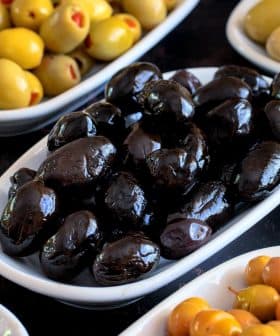Exemption from U.S. Tariffs Creates Opportunity for Greek Exporters
Recently imposed tariffs on some Spanish olive oil exports to the United States could help Greek producers and exporters increase their presence in the lucrative U.S. olive oil market.
 Cargo ship in the Greek port of Volos
Cargo ship in the Greek port of VolosThe exemption of Greek olive oil from American tariffs on European Union agricultural goods presents an opportunity for Greek exporters to increase their olive oil sales in the United States and claim market share previously dominated by Spain. Despite this opportunity, experts caution that Greece has not yet made significant inroads into the American olive oil market, and that Spanish producers may find ways to continue exporting olive oil to the U.S. without being significantly impacted by the new tariffs.
The exemption of Greek olive oil from the list of American tariffs on European Union agricultural goods has been welcomed as an opportunity for exporters to increase their olive oil sales to the United States and claim part of the market share previously dominated by Spain.
However, olive oil industry experts and experienced exporters in Greece said that the situation is more complex than it seems for olive oil producers and exporters looking to advance their businesses on the other side of the Atlantic Ocean.
Greece has not yet penetrated the American market to such a degree to be able to say that the tariffs imposed on Spanish olive oil will open a wide window for us.
The American market is of utmost importance to the Spanish agricultural sector when it comes to olive oil, the experts said, with exports of around 75,000 tons and a revenue of almost €400 million ($442 million) for Spanish producers and exporters in 2018.
In that sense, Spain is expected to stand its ground and devise new ways to channel its olive oil to the American market after the new tariffs come into effect.
See Also:Olive Oil Trade NewsOn the other hand, Italy, the second largest exporter of olive oil to the U.S., also had the new tariffs waived, meaning that Italian producers and exporters will in turn pursue a larger portion of the American olive oil market.
As far as Greece is concerned, edible olives are by far the strongest export product of the olive sector to the U.S. in terms of value, reaching a revenue of more than €130 million ($143 million) in 2018. At the same time, olive oil brought back around €41 million ($45 million) to Greek exporters and covered only three percent of the U.S. market.
With the new tariffs en route the road is not wide open, but the opportunity exists for Greek olive oil to increase its share in the U.S. market, the experts said. However, the whole chain of olive oil (producers, millers, exporters, and the state) should act quickly, they advised, to fill the gap and advertise the quality and the added value of the Greek olive oil to the American consumers.
Giorgos Economou, the executive director of SEVITEL, the association of Greek olive oil bottlers, told Olive Oil Times that it is almost wishful thinking to be able to push aside Spain in the American olive oil market.
“I would not rush to celebrate the exemption of Greece from the new tariffs,” Economou said. “Spain is the biggest olive oil producer in the world, with a large exporting network and an established position in the U.S. market.”
“Spanish exporters have already sent reserve olive oil to the U.S. since last May, as a precautionary measure to balance any repercussions stemming from the new tariffs,” he added. “So, I do not expect the forthcoming tax measures to have an immediate effect on the exports of Spanish bottled olive oil to the U.S.”
Economou also highlighted the fact that other paths exist for Spain to send its olive oil to America and avoid the new tax.
“Since the new tariffs are not applied on non-standardized Spanish olive oil, producers in Spain can export olive oil in bulk and use their existing packaging facilities in the U.S. to bottle it on American soil, escaping the new tariffs in this way,” he said. “Or they can even create a triangle with Portugal, which was exempted from the new tax, and export their bottled olive oil through their neighbor.”
Bottling bulk Spanish olive oil in the U.S. would raise its retail price, but this would be at a less significant cost compared with the 25 percent tariff recently imposed.
When it comes to Greece, Economou said that the country is still a small player in the American olive oil market, and there is no guarantee that the favorable conditions created by the trade war will exist forever.
“Greece has not yet penetrated the American market to such a degree to be able to say that the tariffs imposed on Spanish olive oil will open a wide window for us,” he said. “But I also believe that the trade war between the E.U. and the U.S. will continue in other areas and things regarding olive oil may again change in the future. So, a return to the previous status cannot be ruled out. All in all, it is not safe to assume that the tariffs will help Greece increase its exports of olive oil to the U.S. in the long run.”
Despite the limited perspective, Economou said that Greek olive oil is not widely known in the U.S. and a plan to further promote it should be put in action now, using tools such as the “Enterprise Greece” program that provides leverage to businesses to further assist their exporting efforts.









